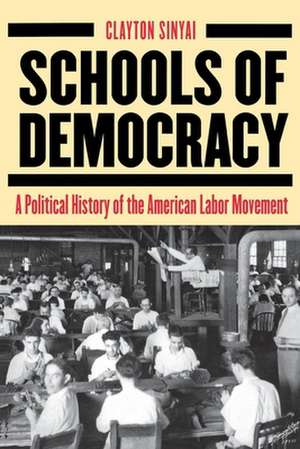Schools of Democracy – A Political History of the American Labor Movement
Autor Clayton Sinyaien Limba Engleză Paperback – 30 mar 2006
In tracing the course of the American labor movement from the founding of the Knights of Labor in the 1870s to the 1968 presidential election and its aftermath, Sinyai explores the political dimensions of collective bargaining, the structures of unions and businesses, and labor's relationships with political parties and other social movements. Schools of Democracy analyzes how labor activists wrestled with fundamental aspects of political philosophy and the development of American democracy, including majority rule versus individual liberty, the rule of law, and the qualifications required of citizens of a democracy. Offering a balanced assessment of mainstream leaders of American labor, from Samuel Gompers to George Meany, and their radical critics, including the Socialists and the Industrial Workers of the World, Sinyai provides an unusual and refreshing perspective on American labor history.
| Toate formatele și edițiile | Preț | Express |
|---|---|---|
| Paperback (1) | 261.22 lei 6-8 săpt. | |
| MB – Cornell University Press – 30 mar 2006 | 261.22 lei 6-8 săpt. | |
| Hardback (1) | 723.20 lei 6-8 săpt. | |
| MB – Cornell University Press – 30 mar 2006 | 723.20 lei 6-8 săpt. |
Preț: 261.22 lei
Nou
Puncte Express: 392
Preț estimativ în valută:
49.99€ • 51.89$ • 41.68£
49.99€ • 51.89$ • 41.68£
Carte tipărită la comandă
Livrare economică 22 martie-05 aprilie
Preluare comenzi: 021 569.72.76
Specificații
ISBN-13: 9780801472992
ISBN-10: 0801472997
Pagini: 304
Dimensiuni: 152 x 229 x 21 mm
Greutate: 0.43 kg
Editura: MB – Cornell University Press
ISBN-10: 0801472997
Pagini: 304
Dimensiuni: 152 x 229 x 21 mm
Greutate: 0.43 kg
Editura: MB – Cornell University Press
Descriere
In this new political history of the labor movement, Clayton Sinyai examines the relationship between labor activism and the American democratic tradition. Sinyai shows how America's working people and union leaders debated the first questions of...
